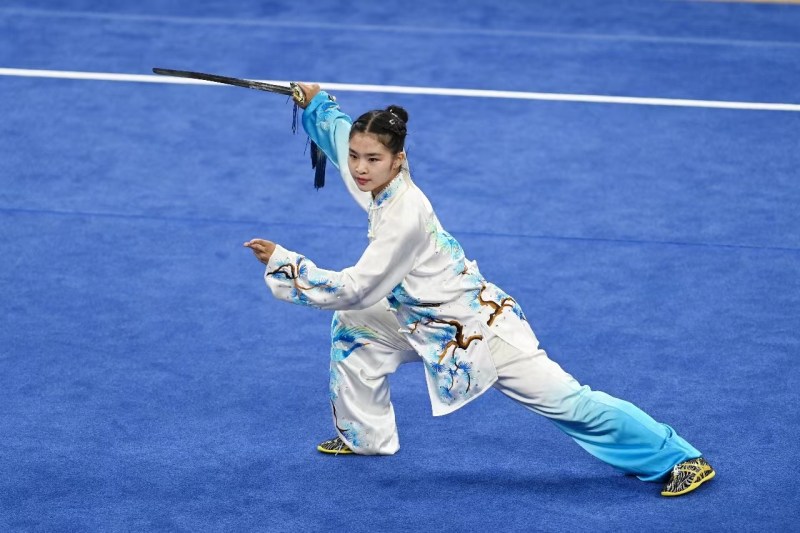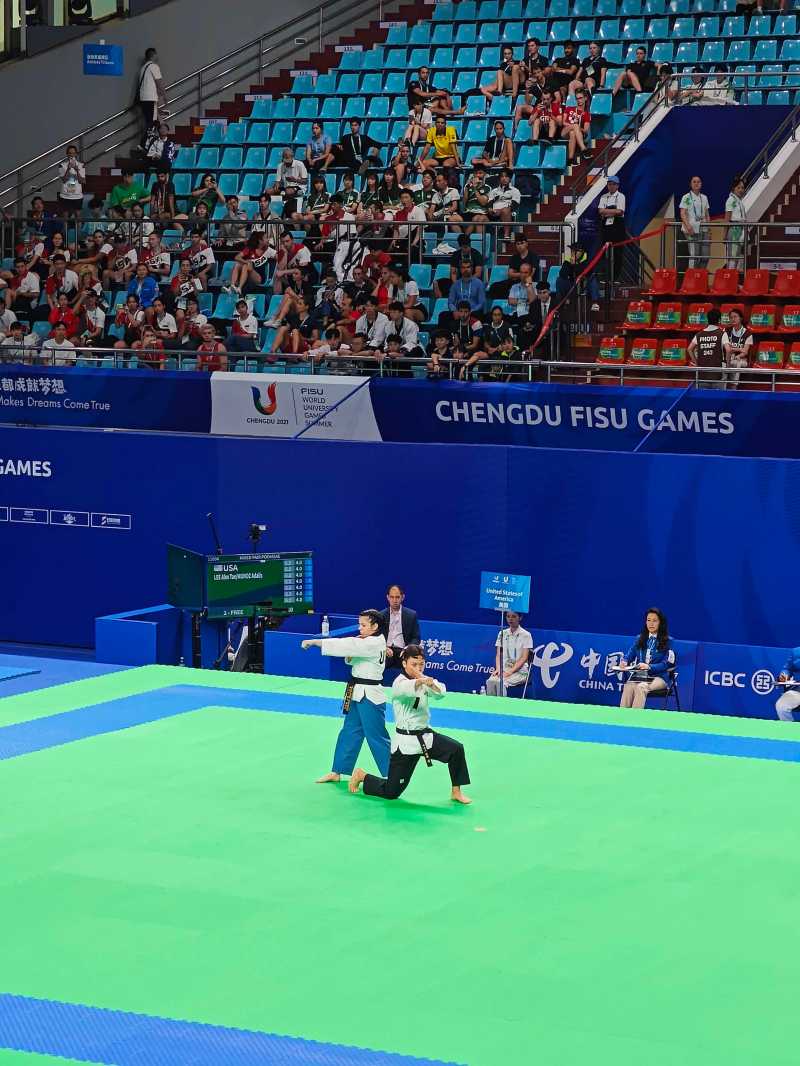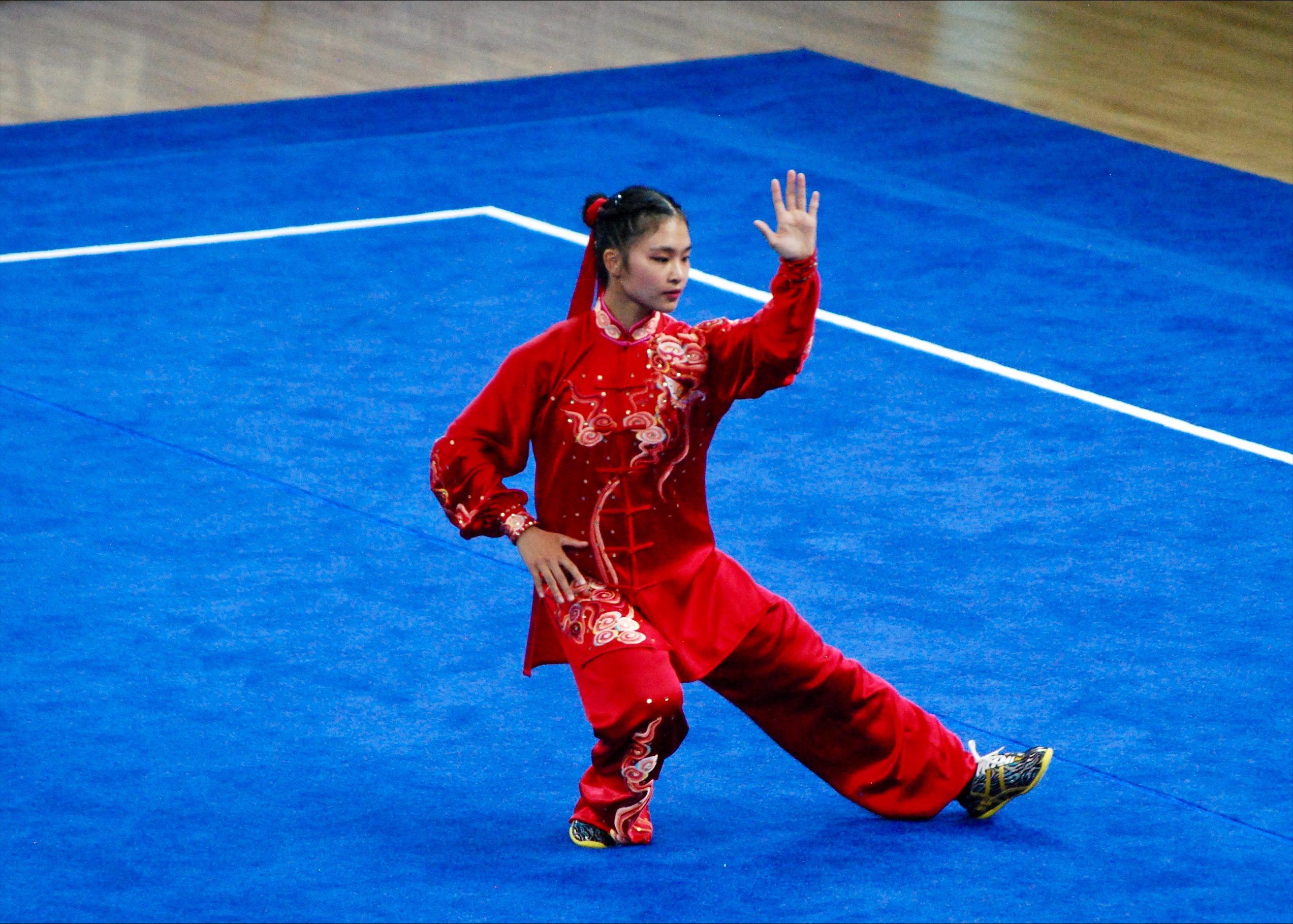Six Stanford students competed in the 2023 FISU World University Games in Chengdu, China this summer — the first time the games were hosted since the start of the COVID-19 pandemic.
Alex Lee ’22 M.S. ’23, Marisol Torro ’24, Amy Tang ’25, Judy Liu ’26, Zhier Fan ’26 and Hayden Kwan ’26 attended the competition, which included taekwondo, judo, wushu and swimming events. Many earned top-10 finishes.
During the opening ceremonies, students carried the American flag and marched around the stadium. “We were all extremely impressed with the fireworks display,” said Fan, who competed in the swimming event.
Torro, who competed in the judo event, also said that the opening ceremonies were a highlight of the experience. “It was very surreal and a special experience to be a part of something this grand. We all felt celebrated,” Torro said.
To qualify to represent the U.S. in judo, Torro won the National Collegiate Judo Association Championships for the 57 kilograms and under category. After qualifying, Torro trained for the Games while working a full-time internship. Since Stanford’s judo club shut down during the COVID-19 pandemic and is yet to return to campus, Torro commuted to San Jose State University to train.

Torro at the University Games judo competition. (Courtesy of Marisol Torro)
Torro’s competition at the University Games did not go as she had hoped when she failed to overcome competitors from India and Italy to advance to the next round. “Both of the matches were tough but also winnable. I learned a lot from both of them and competing at an international elite level,” she said.
Torro said she hopes to return to the international stage at the 2025 World University Games. “I am already inspired and motivated to keep working even harder,” Torro said.
Liu was injured during a competition last year and was unable to walk for months afterwards. This year was an opportunity at redemption: “I think competing in the University Games is like a blessing. After last year, I didn’t know if I would ever be able to compete on the world stage again and show people what I’ve been working on,” Liu said.
A month into her frosh year, Liu resumed her wushu training through the Stanford Running Club and an off-campus wushu club. She hopes to create a wushu club at Stanford this fall.
Wushu is a traditional martial art form that originated in China and has two main disciplines: sanda and taolu. Taolu has three distinct styles including Liu’s specialty, taiji, which is further differentiated as taijiquan (or tai chi), the fist form, and taijijian, the sword form. Liu competed in both during the University Games.

Liu competes in the Taijijian competition in the University Games. (Courtesy of Judy Liu)
“The most specific skills of wushu are mental control, body language with beauty, fight skills, drama performance skills and eye contact with personal spirit showing,” said Zou Yunjian, who is Liu’s coach.
According to Liu, tai chi is a misunderstood sport. “Some people often criticize it like, ‘You’re not doing tai chi you’re just dancing,'” Liu said. “I want to show that I’ve taken this philosophy, put it into my form, and my life. I just want to show that this is what tai chi is.”
While Liu mostly focused on the wushu tai chi professional skill in her training, she also studied philosophy to better understand tai chi culture and body language arts.
“I hope she can show off her skills in the combination of traditional fighting and modern arts with spirit. We want to win, but also win people’s respect,” Yunjian said before the competition. Liu ended the University Games with a sixth-place finish in taijiquan and an eighth-place finish in taijijian.
Lee competed in the taekwondo competition at the Games, focusing specifically on the poomsae category, a choreography where you do a set number of motions of attacking and defending. Poomsae is scored based on the accuracy of the presentation, the athlete’s power and the athlete’s kicks. In order to qualify for the Games, athletes are asked to compete in both traditional combat and freestyle poomsae, which Lee prepared while pursuing a computer science masters at Stanford.
“Getting ready for competition at the same time with classes was really hectic,” Lee said. Lee, who has competed in Taekwondo since he was five, trained alone and with a physical therapist for the University Games, while also relying on help from the Stanford Taekwondo Team.
“The Stanford Taekwondo Team has really supported me a lot throughout the journey. I really appreciate their support,” Lee said.
The University Games, where Lee earned a bronze medal, marks an end to competition for the athlete. “This is my last major competition, and I’m hoping to meet a lot of people, socialize and just enjoy it all,” Lee said in an interview shortly before the games.
“I have been to the Pan American Games and World Championships, but I wasn’t able to go to the University Games. I can finally now say that I’ve been able to go to all three of the major events,” Lee said.

Lee competes in Taekwondo at the University Games. (Courtesy of Alex Lee)
Fan, Kwan and Tang competed at the Games in swimming.
Kwan swam in the 50-, 100-, and 200-meter backstroke as well as two relays: mixed 4×100 medley relay and men’s 4×100 medley relay. He placed eighth in the mixed medley relay and 12th in the 200-meter backstroke.
Kwan said the times were “a bit slower than my personal bests” since he was not able to rest much amid preparation for the Asian Games in September. His first time at the competition, Kwan said he especially enjoyed the opportunity to meet athletes from a variety of sports.
Fan competed in the 100-meter and 200-meter breaststrokes and placed ninth and 19th in the events, respectively.
Like Kwan, Fan said he enjoyed watching and competing against other top athletes.
“In both of these events, I was lucky enough to observe and compete against the reigning world champion, Qin Haiyang. That was a great learning experience, observing how he warmed up his body and prepared for the race, as well as sitting next to him in the ready room,” Fan said.
Fan described the competition as one of the most remarkable of his career and said coaches who previously attended the Olympics “said that this was one of the closest replicas that they had seen.”
“Competing, cheering and just walking around at the Village was incredible to me,” Fan said.
